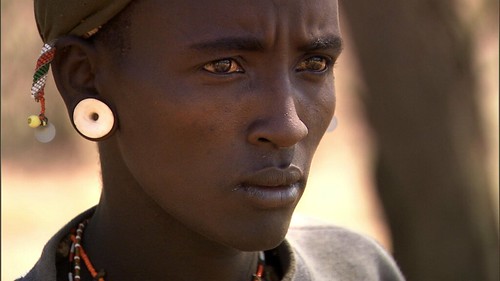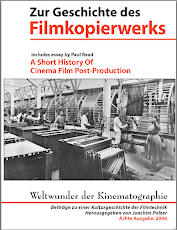 Film-Nr.: 451
Film-Nr.: 451Vorführungstermin: Samstag, 15. August 2009, 19.30 Uhr [VN45]
Themenschwerpunkt: Afrikanische Lebenswelten (5) | Kenia | Namibia | Südafrika | Tierschutz (1)
Englischer Titel: Milking The Rhino
Originaltitel: Milking The Rhino
Deutscher Titel: Das Nashorn wird gemolken
Herkunft: USA 2008
Laufzeit: 83 min.
Sprachfassung: Englische Originalfassung (tw. Maa, Otji-Himba)
Regie: David E. Simpson
Produzent: David E. Simpson
Drehbuch: David E. Simpson
Schnitt: David E. Simpson, Liz Kaar
Kamera: Jason Longo
Musik: Mark Bandy
Sprecher: Munyikombo Bukusi
Produktion: Kartemquin Films, Chicago
URL Film-Homepage: http://MilkingTheRhino.org | http://www.kartemquin.com
Premierenstatus: Deutsche Erstaufführung
Bisherige Aufführungen: International Documentary Festival Amsterdam (IDFA), "In Competition" for the Joris Ivens Award, Amsterdam, Niederlande; Tales From Planet Earth Film Festival, Madison (Wisconsin) USA; Jerusalem International Film Festival, Jerusalem, Israel; Cottonwood Creek Environmental Film Festival, Encinitas (Kalifornien) USA; Dutch Environmental Film Festival, Amsterdam, Niederlande; Rodos International Film and Visual Arts Festival “Ecofilms”, Rodos, Griechenland; DOXA Documentary Film Festival, Vancouver, Kanada; Planete Doc Review, Warschau, Polen; Berkshires International Film Festival, (Massachusetts) USA; Egypt International Film Festival, Ägypten; Wild Cinema, Namibia; Oxdox International Documentary Film Festival, Oxford, England, United Kingdom; Environmental Film Festival at Yale University, New Haven (Connecticut) USA; Full Frame Documentary Film Festival, Durham (North Carolina) USA; TV Ausstrahlung Independent Lens / PBS; DC Environmental Film Festival, Washington (D.C.) USA; Filmfestivaln Vera, Mariehamn, Finnland; Cinema Planeta Environmental Film Festival, Cuernevaca, Mexiko; San Luis Obispo International Film Festival, San Luis Obispo (Kalifornien) USA; Illinois Humanities Council at Dusable Museum, Chicago, (Illinois) USA; Cleveland International Film Festival, Cleveland (Ohio) USA; Portland International Film Festival, Portland (Oregon) USA; University of Chicago Doc Films, Chicago (Illinois) USA; Pan African Film Festival, Los Angeles (Kalifornien) USA; Hot Docs "Doc Soup" Series, Toronto, Kanada; Big Sky Documentary Film Festival, Missoula (Montana) USA; ZagrebDox, Zagreb, Kroatien; Sedona International Film Festival, Sedona (Arizona) USA; Honolulu Film Festival, Silver Lei Award, Honolulu (Hawaii) USA; Reeltime Independent Film & Video Forum, Evanston (Illinois) USA; Goethe Institut, Nairobi, Kenia; Regional Conservation Science Policy Conference, Accra (Ghana) USA; Santa Barbara International Film Festival, Santa Barbara (Kalifornien) USA; Santa Fe Film Center, Santa Fe (New Mexico) USA; Barbados International Film Festival, Barbados; The Backlot Festival, Paramarimbo, Surinam; Santa Fe Film Festival, Santa Fe (New Mexico) USA; Chicago Humanities Festival, Chicago, (Illinois) USA: Gene Siskel Film Center, Chicago (Illinois) USA; TriContinental Film Festival, Südafrika;
Kurzinhalt: Nach einem Jahrhundert des "weißen Tierschutzes" breitet sich langsam die Erkenntnis aus, dass Tierschutz in Afrika nicht ohne und nicht gegen die indigenen Völker und Stämme erfolgreich sein wird. Neue Strategien sind gefragt, von denen dieser Film aus Kenia, Namibia und Südafrika berichtet.

Trailervideo: http://globians.blip.tv/file/2253246 + http://www.youtube.com/watch?v=4vgxGnemvzw
Englische Synopsis: The Maasai tribe of Kenya and Namibia's Himba — two of Earth's oldest cattle cultures — are in the midst of upheaval. Emerging from a century of "white man conservation" that turned their land into game reserves and fueled resentment towards wildlife, they are now vying for a piece of the wildlife-tourism pie. Charting the collision of ancient ways and Western expectations, MILKING THE RHINO tells intimate, hopeful and heartbreaking stories of people facing deep cultural change.

Englische Werkbeschreibung: A ferocious kill on the Serengeti? Dire warnings about endangered species? These cliches of nature documentaries ignore a key feature of the landscape: villagers just off-camera, who navigate the dangers and costs of living with wildlife on a daily basis. When seen at all, rural Africans are often depicted as the problem. They poach animals and encroach on habitat, they spoil our myth of wild Africa. MILKING THE RHINO tells a more nuanced tale of human-wildlife coexistence in post-colonial Africa. The Maasai tribe of Kenya and Namibia's Himba — two of Earth's oldest cattle cultures — are in the midst of upheaval. Emerging from a century of "white man conservation" which turned their lands into game reserves and fueled resentment towards wildlife, Himba and Maasai communities are now vying for a piece of the wildlife-tourism pie. Community-based conservation, which tries to balance the needs of wildlife and people, has been touted by environmentalists as "win-win". The reality is more complex. "We never used to benefit from these animals", a Maasai host of a community eco-lodge explains. "Now we milk them like cattle!" His neighbor disagrees: "A rhino means nothing to me! I can't kill it for meat like a cow." And when drought decimates the grass shared by livestock and wildlife, the community's commitment to conservation is sorely tested. Charting the collision of ancient ways with Western expectations, MILKING THE RHINO tells intimate, hopeful and heartbreaking stories of people facing deep cultural change.

Persönliche Anmerkung des Festivalkurators: Wenn wir einen Film zum Globians Doc Fest vorsichten, dann schauen wir uns immer den Film an und nie die Liste aller Festivals, auf denen der betreffende Film bisher bereits gelaufen ist. Dass es sich in diesem Falle nun um die wohl längste Liste von Festivals des betreffenden Films, der beim diesjährigen Globians Doc Fest Berlin gezeigt wird, handelt, haben wir beim Sichten eigentlich bereits geahnt. Wenn man wenig Zeit hat, sich Filme beim Globians Doc Fest Berlin anzusehen, dann sollte man diesen hier aber unter keinen Umständen verpassen.
Dieser Film aus dem Programm des Globians Doc Fest wird wiederholt und zwar am 28. Oktober 2009 um 21.00 Uhr im Eiffelturm-Kino Berlin (im Centre Français de Berlin), Müllerstr. 74, U-Bahnhof Rehberge/Afrikanische Straße.
GLOBIANS DOC FEST BERLIN
August 12 - 17, 2009
Kino Toni, Antonplatz












Keine Kommentare:
Kommentar veröffentlichen
Hinweis: Nur ein Mitglied dieses Blogs kann Kommentare posten.